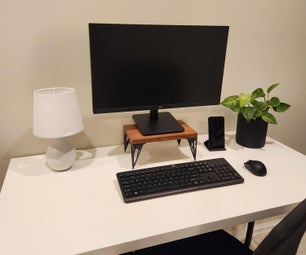Introduction: Magnetic Silly Putty
Thinking Putty (also known as Silly Putty) is a silicone polymer children's toy. Silly putty is fun because it has some unique properties: it is viscoelastic, meaning it can be stretched and shaped and mashed back together again; and as its apparent viscosity increases directly with respect to the amount of force applied (read: it can be torn or shattered with impact). Silly putty is a non-Newtonian viscoelastic polymer, better characterized as a dilatant fluid. Also, it bounces.
Ok, enough science. I'm sure we've all played with Thinking Putty in our youth, but how about magnetic silly putty?
By adding a ferrous component to an already wacky toy we can keep all characteristics of the original putty, but now have the additional dimension of magnetism! I've seen magnetic thinking putty for sale on otherwebsites, but I'll show you how you can make your own for a fraction of the price and in about 20 minutes.
Enough talk, let's make some magnetic putty!
Step 1: Tools + Materials
tools:
| materials: |
The secret ingredient that makes the putty magnetic is an iron oxide powder, which is ferric (magnetic). Ferric iron oxide is a fine powder used as black pigment and can be found at art stores. If your local artist supply store doesn't carry it, you can always purchase it black iron oxide powder![]() online.
online.
Step 2: Prepare Putty
Start by clearing a space to work, make sure it is well ventilated. Iron oxide powder is very fine and inhaling it is probably not such a good idea. Put on your gloves and face mask before you begin.
Open the thinking putty and remove from the container. Work the putty in your hands a little to warm it up, then stretch it out like a sheet and lay it on your disposable work surface (sheet of paper or paper plate).
Step 3: Add Iron Oxide
Thinking Putty comes in different sizes, depending on where you purchase it. I found mine in a local toy shop, it comes in an egg-shaped container and is about 24 grams (0.8 oz).
For this size, I used about a tablespoon of iron oxide, you may require more or less depending on your putty size and amount of magnitism desired.
Carefully spoon the iron oxide into centre of putty sheet, then close lid on iron oxide powder to reduce excess iron dust escaping.
Step 4: Work It
Gently fold edges of putty sheet into centre and work the powder into the putty. Go slow, the powder produces lots of dust.
After a minute of massaging the putty it will lose it's colour and begin to look black as pitch. Keep massaging putty for about 3-4 minutes.
Step 5: Experiment and Have Fun!
That's it, you're done! Grab your magnet and start experimenting with your new magnetic putty.
You can stretch out a strand and make it follow your magnet, you can polarize your putty to work as a magnet itself, and then there's the classic of placing the magnet directly on the putty and watching it envelop the magnet. There's plenty of fun to be had, check out the video I made with some of the fun you can do.
Some frames have been sped-up to illustrate magnetic properties.
Of course, aside from being magnetic your putty still retains all the properties of the original Silly Putty.
Caution:
Putty has been known to leave a residue on some surfaces, even more so with the iron oxide powder. Use caution when playing with your magnetic putty.
If you get magnetic putty stuck to fabric you can try placing the magnet on top of the fabric and the putty may work it's way out (wait 24 hours). Alternatively you can apply rubbing alcohol to area and work out the putty, try a concealed test-area first. WD-40 may also work. If all else fails, take the fabric to the dry cleaners and tell them it's a silicone-based stain.
What are you waiting for? Get going and make your own magnetic putty!
Place a picture or video of your version of magnetic putty in the comments below.
Have fun! Happy making :)

Participated in the
Toy Challenge













